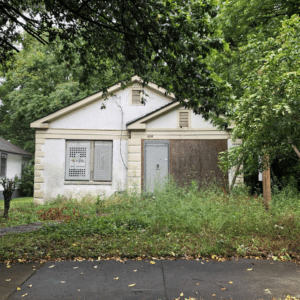During the first half of the 20th century, the historic Westside was a bustling middle-class Black community with manicured neighborhoods – but as socioeconomic inequities set in, so did neglect.
Over the years, many properties on the Westside became vacant, abandoned and blighted, leaving rotting shells of former homes engulfed in overgrown vegetation. The unsightly nature of the situation pushed out families, and drew in crime.
Lee Harrop, vice president of Real Estate Development at Westside Future Fund (WFF), says it’s a cycle that without intervention will only get worse, which is why the organization is working to purchase as much of the blighted property as possible to help beautify and sustain the community.
“One of the reasons we work so hard to purchase, secure and maintain these blighted properties is that blight leads to more blight. It’s the broken window theory—if you fix the broken window, people won’t feel as inclined to break the one next to it,” said Harrop.
To date, WFF has purchased 189 vacant or blighted properties on the Westside—120 vacant lots and 69 severely deteriorated single family homes. Of those single family homes, 25 have been or are slated for demolition due to safety concerns. An additional 18 have been renovated and sold or rented, and 29 more are either under construction or awaiting city permitting.
One area of focus in the clean-up effort has been the streets surrounding the newly-constructed Kathryn Johnston Memorial Park. While partner organization Park Pride was redeveloping the park, WFF set off to purchase and clean-up blighted properties on surrounding blocks. The side-by-side projects had a double-dipper effect, reducing blight and increasing quality of health and life for people living next to the park in the future and preserving that land for legacy residents.
“We try to take blight out of the equation anywhere that we can. We managed to get rid of all the blight in the Kathryn Johnston Memorial Park development area, so now we’re focusing on the next blocks beyond that. Removing the blight has also pushed out squatters, many of whom were engaging in illegal activity. By pushing them out, the park area has become much safer for families and children,” said Harrop.
On Proctor Street, one of the streets bordering the park, WFF has already constructed, sold and closed several homes through the Home on the Westside program. The program aims to provide legacy residents of the Westside with newly-renovated or constructed, affordable homes in the community.
While WFF works to redevelop and rejuvenate these properties, they have to be secured, consistently monitored and maintained.
Thanks to a partnership with Westside-local non-profit Integrity Home Solutions, that maintenance is made easier, says Raquel Hudson, director of Property Assets and Volunteer Programs.
“Integrity Home Solutions makes sure our properties are cut regularly, keeping the grass at a proper height, cutting back bushes and branches and keeping the properties beautified. They also check to make sure there’s no dumping or trash, which is a huge problem here on the Westside, particularly on vacant properties. If there is, Integrity Home Solutions cleans it up for us,” said Hudson. “They’ve been a great partner in helping us in our mission.”
In cases where clean up efforts may need to be more extensive, Integrity Home Solutions helps identify key areas for WFF monthly Community Cleanup, volunteer events that aim to remove trash and overgrowth over larger areas.
The purchase, maintenance and renovation of these blighted and vacant properties is essential to the organizational mission of WFF to revitalize the Westside, and the organization has plans in store to continue this effort over the coming years.

